Fox News Flash top headlines for October 1
Fox News Flash top headlines are here. Check out what's clicking on Foxnews.com.
A retired Las Vegas Metropolitan Police Department (LVMPD) police officer who responded to the Oct. 1, 2017, shooting that left 58 people dead that night at the Route 91 Harvest festival is reflecting on the "real heros" of that night, five years later.
"It's just important to remember who was lost, who sprung into action that night, what really mattered in that moment. As a nation, I think it paints a picture of who we are as a people that ultimately … whatever your politics are, whatever your skin color is, all kinds of people that night went to serve their fellow man and sprung into action," retired LVMPD officer Ashton Packe told Fox News Digital in a Friday interview. "And I just think it's a testament to us as a country."
Packe credited a large part of the "healing process" to the Vegas Golden Knights hockey team immediately after the shooting.
"That team, and how they honored the victims, the first responders, the nurses, the docs, the cops, the paramedics and just the people, the victims, their families. That really helped," the former officer said. "So, I just saw how the community came together and rallied. … People think Vegas is just … the strip, and that's it. But outside of the strip, Las Vegas is an incredibly loving community that has tons of people [who] have huge amounts of care in their heart for their fellow citizens."
LAS VEGAS SHOOTING: ‘11 MINUTES’ DOCUSERIES DETAILS OF DEADLIEST US SHOOTING IN HISTORY
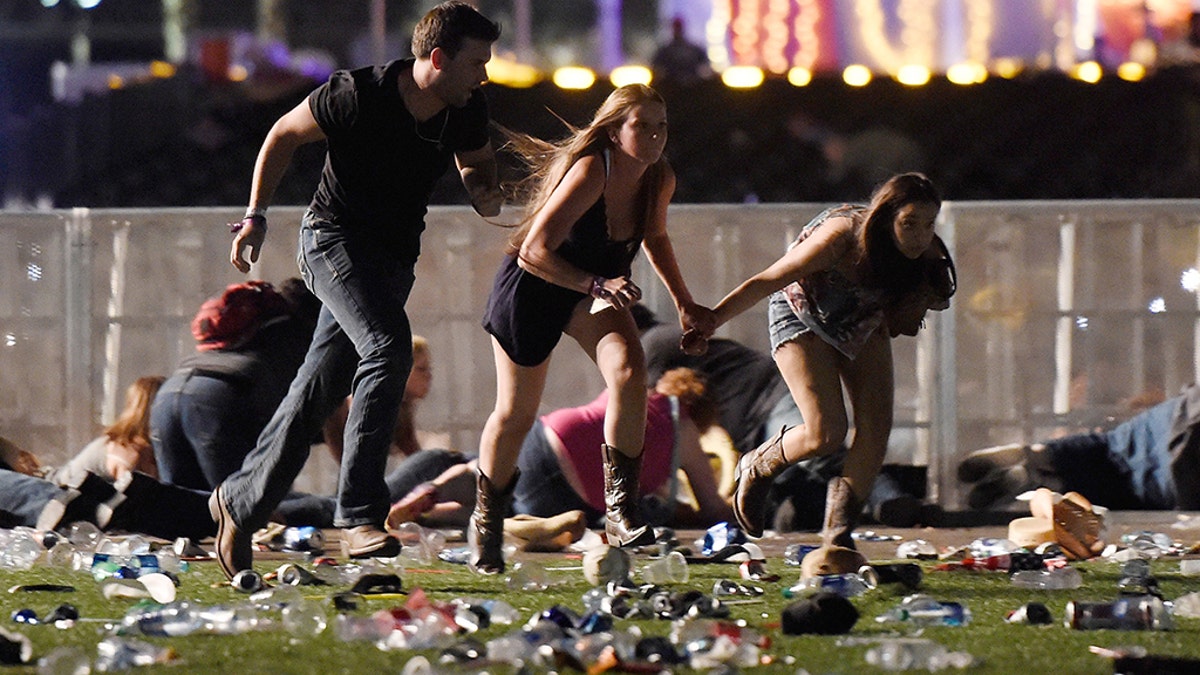
People run from the Route 91 Harvest country music festival after apparent gun fire was hear on October 1, 2017 in Las Vegas, Nevada. (David Becker)
Packe, who served on the LVMPD's Counter-Terrorism Section, said he "had anticipated multiple cell attacks" that evening when he heard initial reports of an attack.
"I thought we were dealing with, you know, a multi-cell international terrorist attack, like what we saw in Mumbai in 2008, where the terrorist organization came over from Pakistan and laid siege to that city in multiple shootings at multiple locations at the same time. So, my heart broke in the initial moments thinking I had missed something in my prevention side of working in the intelligence world and kind of working in the shadows with the federal government and our police department here and all the other surrounding agencies that we work with to prevent these things from happening in Las Vegas, the number one tourist destination in the world."
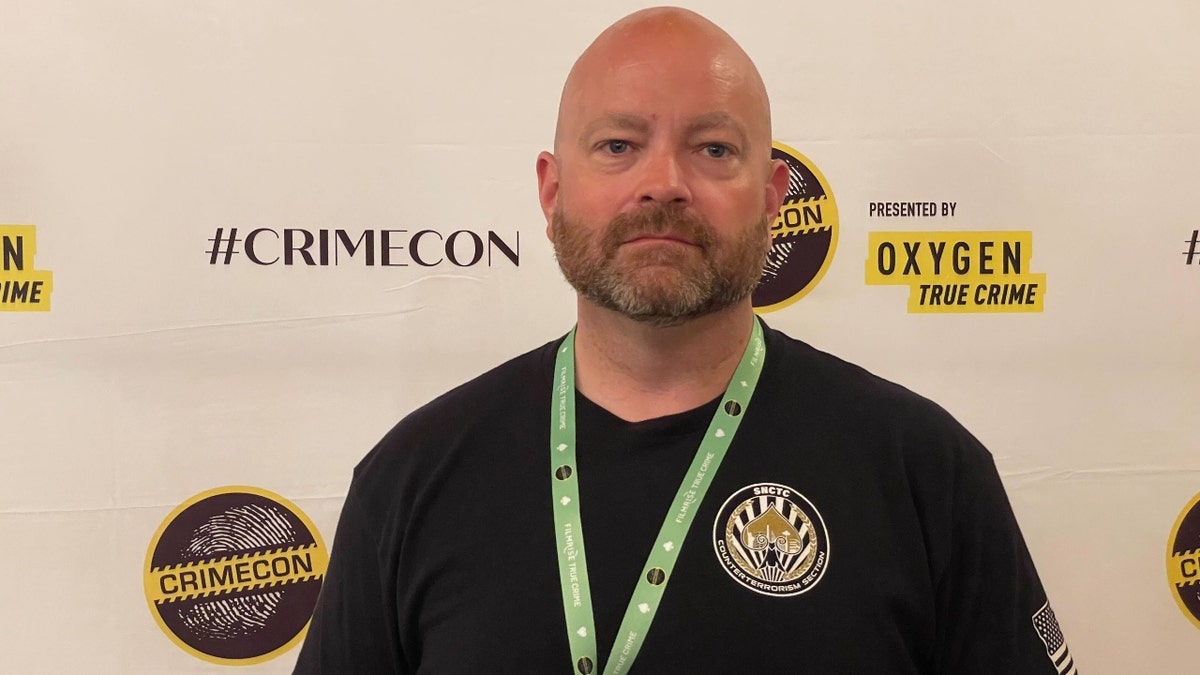
Retired LVMPD and Hope for Prisoners Executive Director of Law Enforcement Engagement Ashton Packe at CrimeCon 2022. (Fox News)
But that didn't end up being the case, as Packe later discovered after Stephen Paddock, 64, opened fire on thousands of concertgoers from the 32nd floor of the Mandalay Bay hotel before killing himself.
Packe also addressed lingering questions about Paddock's motive that night, which remains unclear five years later.
LVMPD told Fox News Digital in a Friday evening statement that it is "important to make the distinction that 58 people died that night, and subsequently two others passed away from their injuries," bringing the total death count from that day to 60.
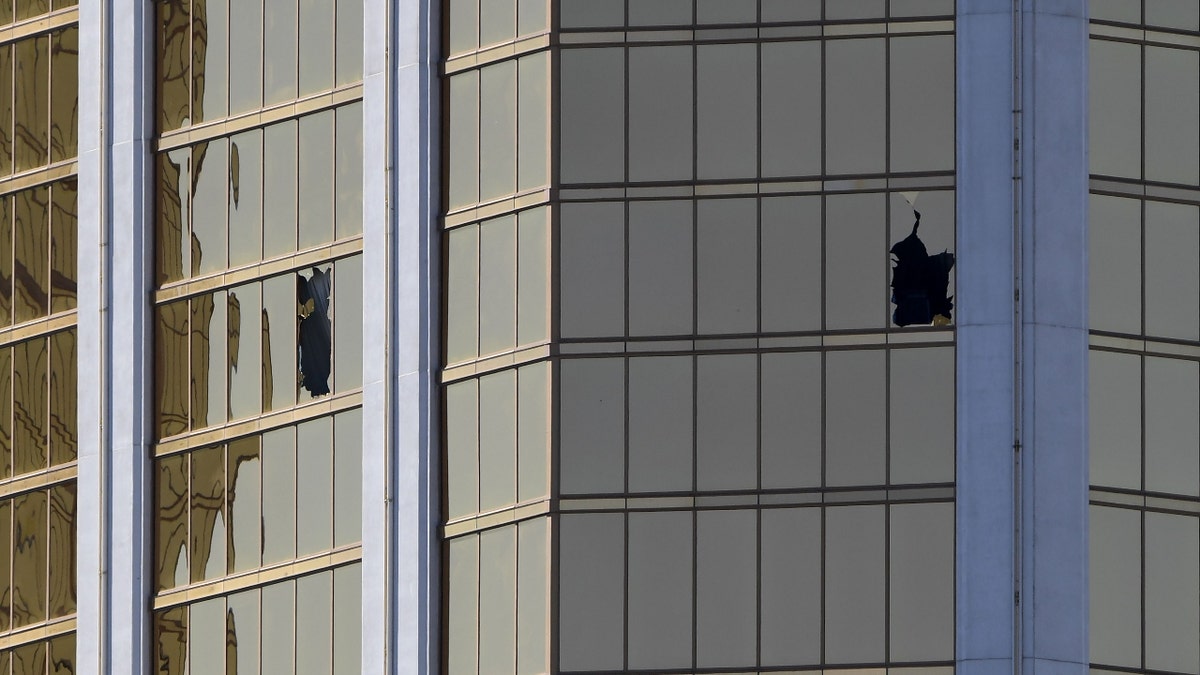
Stephen Paddock opened fire on thousands of concert attendees from the 32nd floor of the Mandalay Bay hotel in Las Vegas on Oct. 1, 2017. (MARK RALSTON/AFP)
LVMPD pointed Fox News Digital to the department's final criminal investigation report into the shooting released on Aug. 31, 2018, when asked about the shooter's motive. The final report, however, makes no distinct conclusion regarding a motive.
"In reference to the 2,000 investigated leads, 22,000 hours of video, 252,000 images obtained and approximately 1,000 served legal processes, nothing was found to indicate motive on the part of Paddock or that he acted with anyone else," the report states.
SWAT ARRESTS CALIFORNIA MAN FOR PLOTTING ‘LAS VEGAS-STYLE’ MASS SHOOTING
Marilou Danley, Paddock's longtime girlfriend, told police in an interview that while she and Paddock, who was known as a "high roller" in Reno, Nevada, lived and traveled all over the world together. She also told police that Paddock was mild-mannered, not violent, and not religious. He would often make comments to Delaney, who was Catholic, like, "Your God doesn't love us." Paddock also did not frequently discuss politics, but Danley told investigators he was pleased with the 2016 election of former President Trump. His step-brother, Eric Paddock, stated that he was neither liberal nor conservative and did not vote in the election, according to the report.
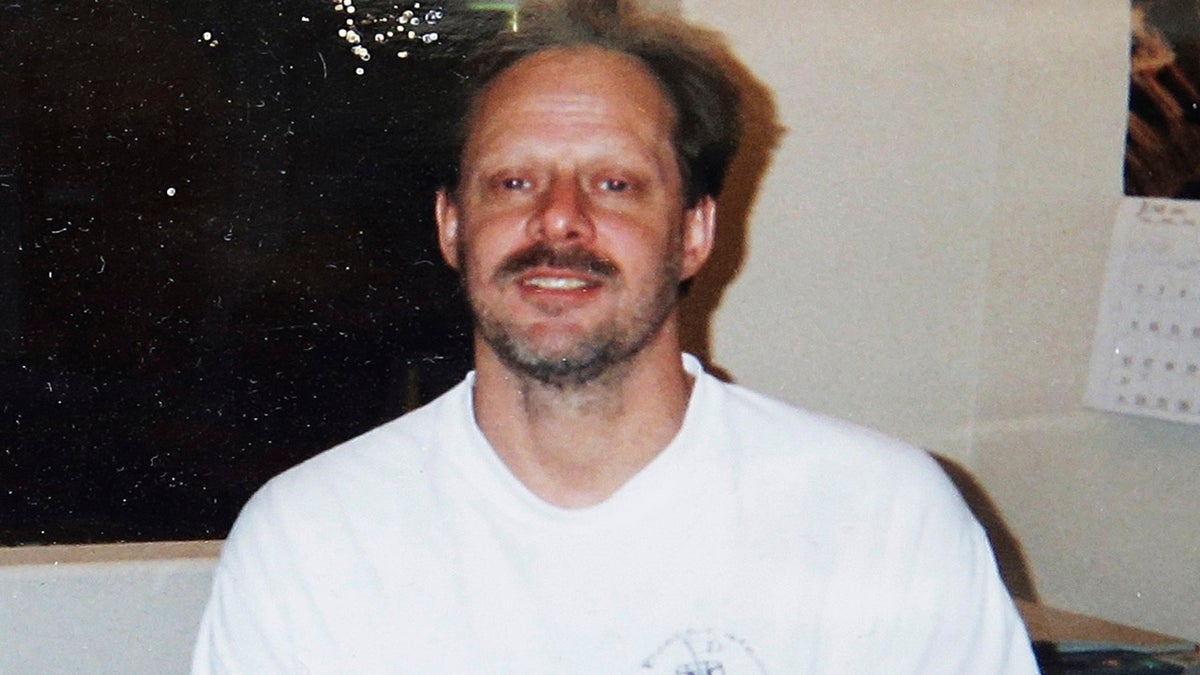
It is still unknown what caused Stephen Paddock to carry out the Las Vegas shooting. (AP/Eric Paddock)
The shooter's girlfriend also told police that Paddock was physically unable to perform sexually and would sleep for long periods of time after physical exertion. He also frequently complained about being sick and said doctors could not help him and told him that he had a "chemical imbalance," the report states. He had a sensitivity to smells, would not shake people's hands and "often wore cotton gloves."
He developed a heavy interest in guns and ammunition before 2017 but did not talk about gun control, according to Delaney. During a September 2017 stay at the Mandalay Bay hotel, Delaney noticed Paddock acting strangely and "constantly looking out the windows of the room which overlooked the Las Vegas Village venue."
Paddock's ex-wife of six years, Peggy Paddock, told police he was "not interested in drawing attention to himself" and "did not buy flashy clothes, jewelry or cars." Paddock's stepbrother, however, said the shooter "needed to be seen as important and needed to be catered to."
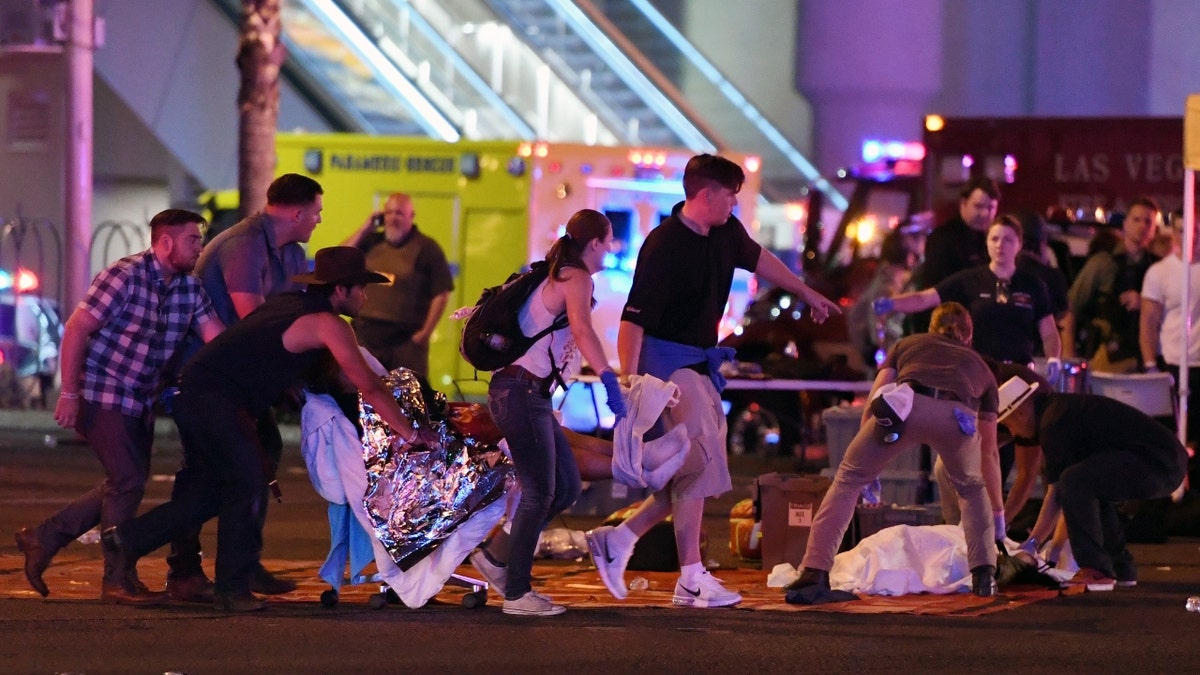
A crowd flees a shooting at the Route 91 Harvest festival shooting on Oct. 1, 2017. (Ethan Miller)
Packe said he can "appreciate" the country's "sruggle with putting the fact that one lone individual could create such horrific carnage," but he and others who were in Las Vegas that night have found peace despite not having all the answers.
"I think we're obsessed with motive as a country," he explained. "I think sometimes the bottom line is just evil. Men are going to do evil things. And thank God there are men and women who are willing to rapidly respond and face them. I think we, as a country, should probably … remember a little bit more the fact that there are men and women willing to face these bad, evil acts at a moment's notice instead of relishing on what's the motive … and getting stuck in that kind of a vicious cycle."
Packe believes most people in Las Vegas probably see "an evil man doing something horrifically bad — shooting people from a distance so he didn't have to see the up close and personal consequences of his actions."
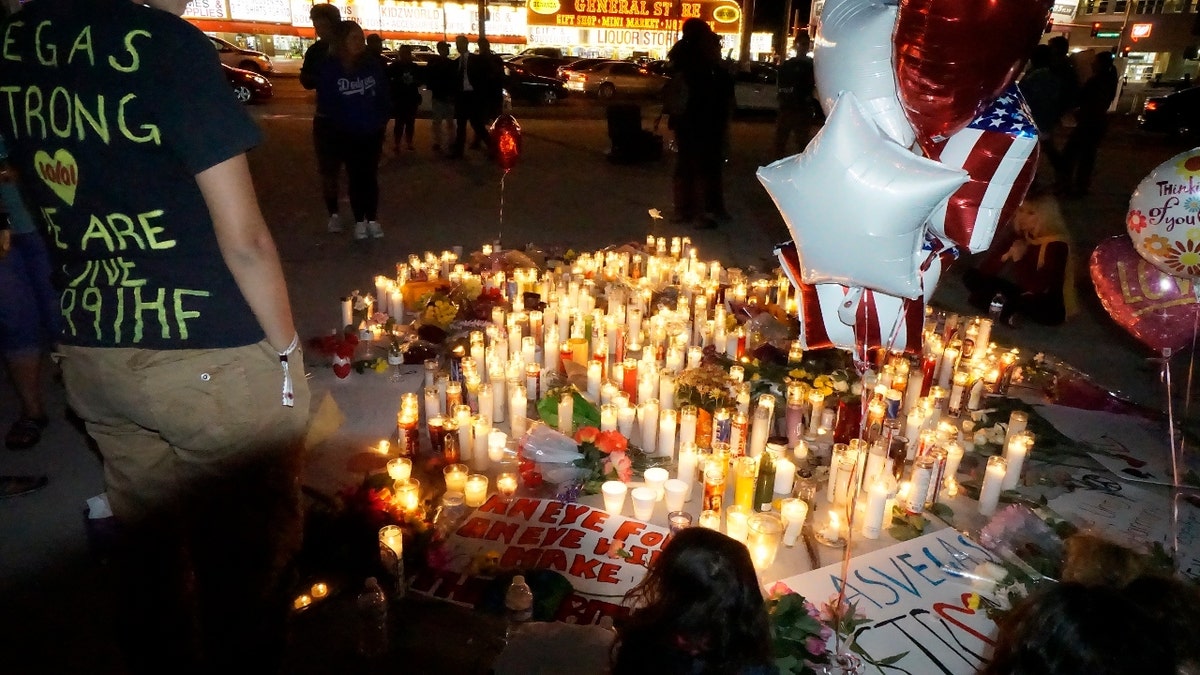
A total of 60 people have died as a result of the Oct. 1, 2017, shooting, including 58 who died that night and two who have died in the years since. (Doug Kranz/Icon Sportswire )
"Angry at a hotel. Angry at perceived injustice. A grievance collector. That's especially what this guy was," Packe said. "He was a classic grievance collector. I'm a victim. Poor me. Someone must pay. And so, I think most Las Vegans understand that … the investigation was done, and … what we found was just the axis of an evil man."
Despite lingering questions about that day, Packe says victims and first-responders have shown incredible strength in recovering from trauma.
CLICK HERE TO GET THE FOX NEWS APP
"I was very concerned in the years after 1 October for the mental health of a lot of our law enforcement officers," he said. "But I think scars sometimes heal into stronger tissue or bone. And I'm saying that metaphorically. Obviously, I'm very relieved at the five-year mark. I was very worried about how many first responders would take their own lives — not being able to [wrap] their minds around what happened. I'm very happy that it's a very low number … and that I think it's a testament to modern policing where a lot of law enforcement executives see the value in employee assistance programs and suicide prevention and counseling and mental health."
Packe, who now aims to become a private investigator, is an advocate of staying healthy both mentally and physically — working out, eating well, staying spiritually active, and getting help when it's needed — in order to recover from trauma and come out stronger on the other side.



